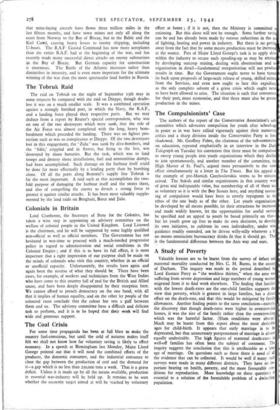The Compulsionists' Case
The authorg of the report of the Conservative Association's su committee which advocates compulsion for youth after school-ag in peace as in war have rallied vigorously against their numerou critics and a sharp division inside the Conservative Party is fore shadowed. Mr. Geoffrey Faber, the chairman of the sub-committe on education, repeated emphatically in an interview in the Dail Telegraph on Tuesday his conviction that there must be compulsio to sweep young people into youth organisations which they declin to join spontaneously, and another member of the committee, the High Master of St. Paul's, argued more persuasively to the sam effect simultaneously in a letter in The Times. But his appeal to the example of pre-Munich Czechoslovakia seems to be miscon• ceived. The Sokols and similar organisations in that country were of great and indisputable value, but membership of all of them was as voluntary as it is with the Boy Scouts here, and anything savour- ing of compulsion would have been as utterly repugnant to the ethos of the one body as of the other. Let youth organisations be developed by all means possible, let their attractions be increased and made widely known, let the opportunities for useful service be specified and an appeal to youth be based primarily on that but let youth grow up free to make its own decisions, to develop its own initiative, to cultivate its own individuality, under wise guidance readily extended, not be driven willy-nilly wherever a bl no means omniscient bureaucracy thinks fit that it should go. Tha is the fundamental difference between the Axis way and ours.


























 Previous page
Previous page